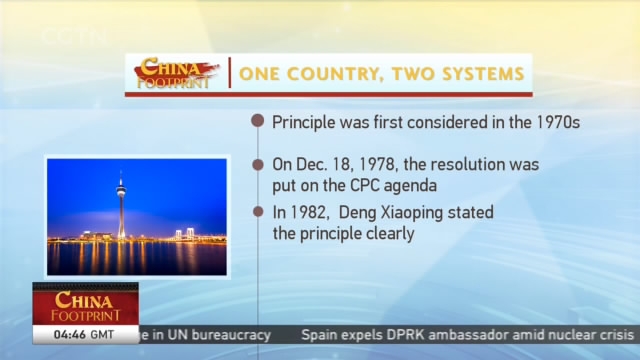
13:33, 19-Sep-2017
One Country, Two System: A brief history of 'One Country,Two System'

For more on the brief history of the "One Country, Two Systems" principle and the central government's support for Hong Kong, I'm now joined by my colleague Wu Guoxiu in the studio.
The "One Country, Two Systems" principle was an idea that first came into existence in the 1970s. It was initially put forward to resolve the question of Taiwan, although it eventually came into effect in the issue of Hong Kong. At the third plenary session of the CPC's 11th Central Committee in Beijing on December 18th, 1978, the resolution of questions on how to deal with Taiwan, Hong Kong, and Macao was discussed. During British Prime Minister Margaret Thatcher's 1982 state visit to China, Deng Xiaoping said the "Mainland practices socialism, and Hong Kong practices the existing capitalist system."
This principle topped the agenda in 22 rounds of negotiations in the two years that followed, until both nations agreed on the date of Hong Kong's return to the Chinese mainland. "One Country, Two Systems" was only a basic principle and policy until the enactment of the Basic Law. That document was drafted in 1985 and approved by the National People's Congress five years later.
The basic principles and policies were translated into a national law with general binding effect, forming the basis for the operation of the Hong Kong Special Administrative Region. Beijing has always prioritized Hong Kong's economic development and the control of risks. Another key document that we need to mention is the Closer Economic Partnership Agreement or CEPA between the Mainland and Hong Kong. It was signed after the SARS outbreak in 2003, which further slowed Hong Kong's economy that was already wobbly due to the Asian Financial Crisis.

SITEMAP
Copyright © 2018 CGTN. Beijing ICP prepared NO.16065310-3
Copyright © 2018 CGTN. Beijing ICP prepared NO.16065310-3